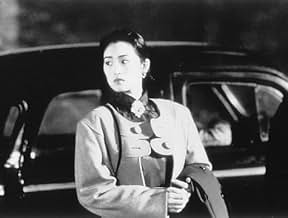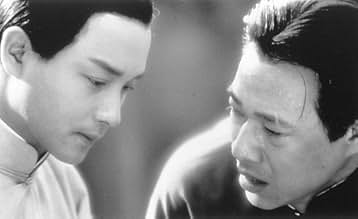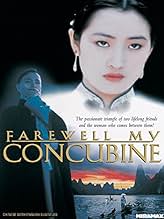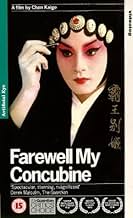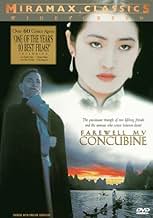CALIFICACIÓN DE IMDb
8.1/10
34 k
TU CALIFICACIÓN
En 1924, dos niños se conocen en una escuela de formación de ópera en Pekín. Forjarán una amistad de casi 70 años y vivirán una de las épocas más convulsas de la historia de China.En 1924, dos niños se conocen en una escuela de formación de ópera en Pekín. Forjarán una amistad de casi 70 años y vivirán una de las épocas más convulsas de la historia de China.En 1924, dos niños se conocen en una escuela de formación de ópera en Pekín. Forjarán una amistad de casi 70 años y vivirán una de las épocas más convulsas de la historia de China.
- Nominado a 2 premios Óscar
- 24 premios ganados y 12 nominaciones en total
Zhenxiang Fei
- Shitou as a Child
- (as Yang Fei)
Argumento
¿Sabías que…?
- TriviaJackie Chan was originally offered the role of Duan Xiaolou due to his own childhood experience of training in the Peking Opera. But he turned it down, fearing that the film, which deals with themes of homosexuality, might tarnish his image.
- ErroresWhen Douzi is first examined by the owner of the opera troupe, his extra finger is on his right hand below the thumb. When he withdraws the hand from the opera troupe owner, he pulls back his left arm. When his mother cuts the extra finger off a few moments later, it is now on his left hand, next to his pinkie.
- Citas
Master Yuan: A smile ushers in the spring.
Master Yuan: A tear does darken all the world.
Master Yuan: How truly does this befit you. To you... only you are possessed of such charm.
- Versiones alternativasThe version presented in the U.S. is different from the original, longer cut, that was distributed internationally. The following differences exist in the U.S. version:
- The scene where Duan and Juxian are drinking after their wedding was originally directly after the wedding scene, rather than after the bloodletting at the Yuan-Cheng dinner.
Opinión destacada
I finally got a chance to see "Farewell my Concubine." I'd been anxious to see it since its initial release in 1993. It surprised me in its depth and technical skill.
Three points make this film outstanding. The first is the technical skill of the director and the luscious taste of the director of photography. The entire film is a feast for the eyes, taking full advantage of elaborate costumes and exotic locations. The second strength is in the actual storytelling. The plot is a fascinating tragedy, it feels almost Shakespearean. The acting is nothing short of incredible. Some of China's finest actors demonstrate their ability to carry a story that covers 52 years. Normally, these two strengths alone would be reason enough to see a film, but "Farewell my Concubine" succeeds in satisfying one more category (the bain of any epic): historical accuracy.
"Farewell my Concubine" is exceptionally accurate in portraying the monumental changes that were sweeping China at the time. The film doesn't just treat these events as background events, but drags them right into the plot and pins the characters into their surroundings. This is interesting when you consider that the story takes place in the Peking Opera, not the most likely place for these events to have effect. Instead, as we see the new China emerge, we watch these vestiges of old society fall, and the work of all involved make this transition an achievement to behold. The power of this film was not missed by Chinese censors who banned, removed, and then banned the film again several times over -debating whether or not its artistic brilliance was worth subversive portrayals of suicide and homosexuality. Unlike "The Last Emperor," this film was made by Chinese film makers and is in tune with its subject. I recommend this film highly!
As one last note, the version I saw was a DVD containing the original 170 minute version of the film, in its wide-screen splendor. From what I understand, the shorter versions released internationally deleted and shortened some opera scenes for fear that they would be lost on Western audiences. Having no prior experience with any Peking Opera, I found the scenes fascinating and integral to appreciating the entire story. Spend the extra time if you can.
Three points make this film outstanding. The first is the technical skill of the director and the luscious taste of the director of photography. The entire film is a feast for the eyes, taking full advantage of elaborate costumes and exotic locations. The second strength is in the actual storytelling. The plot is a fascinating tragedy, it feels almost Shakespearean. The acting is nothing short of incredible. Some of China's finest actors demonstrate their ability to carry a story that covers 52 years. Normally, these two strengths alone would be reason enough to see a film, but "Farewell my Concubine" succeeds in satisfying one more category (the bain of any epic): historical accuracy.
"Farewell my Concubine" is exceptionally accurate in portraying the monumental changes that were sweeping China at the time. The film doesn't just treat these events as background events, but drags them right into the plot and pins the characters into their surroundings. This is interesting when you consider that the story takes place in the Peking Opera, not the most likely place for these events to have effect. Instead, as we see the new China emerge, we watch these vestiges of old society fall, and the work of all involved make this transition an achievement to behold. The power of this film was not missed by Chinese censors who banned, removed, and then banned the film again several times over -debating whether or not its artistic brilliance was worth subversive portrayals of suicide and homosexuality. Unlike "The Last Emperor," this film was made by Chinese film makers and is in tune with its subject. I recommend this film highly!
As one last note, the version I saw was a DVD containing the original 170 minute version of the film, in its wide-screen splendor. From what I understand, the shorter versions released internationally deleted and shortened some opera scenes for fear that they would be lost on Western audiences. Having no prior experience with any Peking Opera, I found the scenes fascinating and integral to appreciating the entire story. Spend the extra time if you can.
- Bobak!
- 26 may 1999
- Enlace permanente
Selecciones populares
Inicia sesión para calificar y agrega a la lista de videos para obtener recomendaciones personalizadas
- How long is Farewell My Concubine?Con tecnología de Alexa
Detalles
Taquilla
- Presupuesto
- USD 4,000,000 (estimado)
- Total en EE. UU. y Canadá
- USD 5,549,086
- Fin de semana de estreno en EE. UU. y Canadá
- USD 69,408
- 17 oct 1993
- Total a nivel mundial
- USD 7,447,084
- Tiempo de ejecución2 horas 51 minutos
- Color
- Relación de aspecto
- 1.85 : 1
Contribuir a esta página
Sugiere una edición o agrega el contenido que falta

Principales brechas de datos
By what name was Adiós a mi concubina (1993) officially released in India in English?
Responda

